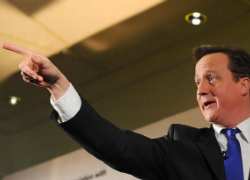The Treaty of Maastricht established the European Union (“the EU”) under its current name in 1993.[1] The Treaty included a Social Chapter that laid “down EU policies on workers’ rights and other social issues.”[2] The Treaty also established an economic and monetary union, which required the Member States to (1) coordinate their economic policies, (2) provide multilateral surveillance of the coordination, and (3) be subject to financial and budgetary discipline.[3] The objective of monetary policy was to ensure the common currency’s “stability thanks to price stability and respect for the market economy.”[4]
Great Britain, however, has never adopted the EU’s single currency, opted out of the Treaty’s Social Chapter, “does not participate in Europe’s Schengen passport-free travel zone,” and “announced last year that it would opt out of a range of justice and security policy areas.”[5]
More specifically, Britain’s Prime Minister, David Cameron, has voiced his frustration with the EU’s economic policies.[6] Cameron has stated: “In the name of social protection, the EU has promoted unnecessary measures that impose burdens on businesses and government, and can destroy jobs.”[7]

(Borsen)
Just a year after his very public criticisms, on January 23, 2013, Cameron announced that if his Conservative Party were to be reelected in 2015, he would either “reduce British entanglement with the EU – or allow his people to vote in a referendum to leave the bloc all together.”[8]
The response to Cameron’s announcement has been mixed globally. In the Eurozone, however, the criticism has come quick. French President Francois Hollande “told the European Parliament there can be no ‘a la carte’ attitude to the EU. [ . . . ] National interests, he said in Strasbourg, risked taking precedence over the interests of the EU.”[9] Hollande also noted that either Europe “must move forward together [. . . ] or we will not move forward at all.”[10]
This first look at the potential impacts of Cameron’s announcement focuses on Great Britain’s current role in the European Union and a few of the political costs that may not be worth any of Great Britain’s solo gains.
A General Overview of the EU
The main governing body, the European Commission, is the only body that can propose new laws for the EU.[11] The Commission is made up of 27 Commissioners—one for each EU member country.[12] The Commissioners are appointed by their home countries and are not popularly elected.[13] “The number of Commissioners will be reduced in 2014, so that not every member-state will have its own Commissioner.”[14]
European citizens, however, directly elect the Members of European Parliament (“MEPs”).[15] There are a total 736 MEPs, while only 72 are from the United Kingdom.[16] According to the BBC, the MEPs as whole have the power to block, scrutinize, and change the laws proposed by the Commission, as well as approve or disapprove of the European Union’s budget.[17]
Finally, the EU Council of Ministers is where the national governments of all 27 Member states come together to debate and vote on both domestic and foreign policy. In 2014, “Parliament will be put on an equal footing with the Council for most issues, including the crucial areas of the budget and agriculture, under a system dubbed the ‘co-decision.’”[18]
A recent New York Times article noted that while officially decisions are made by national governments in the complicated way described above, “[i]n practice, countries strike informal agreements and compromises, often trading support on one issue for a reciprocal agreement, sometimes in an unrelated area of policy.”[19]

(Mirror)
Great Britain’s Current Role
It is no secret that Britain has had a tenuous relationship with the EU despite its status as a Member State; even the giant piece of art that depicts each of the member countries represented on the EU Council of Ministers pokes fun at Great Britain by leaving the country off the mural.[20]
The Potential Gains & Losses
The following chart, originally compiled by BBC’s Brian Wheeler and Laurence Peter, lays out the arguments on both sides of the debate over Britain’s future relationship with the EU.[21] Only arguments pertinent to this posting remain and others have been removed.
|
Key Question |
Better off out |
Better off in |
| Are there any viable options for Britain leaving the EU? | Yes. Britain could negotiate an “amicable divorce”, but retain strong trading links with EU nations. . . .Some favour the Swiss model, based on bi-lateral treaties with the EU rather than membership of the European Economic Area (EEA), a kind of “EU-lite”.Others say the EEA/Norway model would be easier as the UK is already a member of the free trade area.
Some argue for a clean break from the EU, with the UK free to make trade deals with nations around the word. |
No. An “amicable divorce” is a pipe dream.France, Germany and other leading EU nations would never allow Britain a “pick and mix” approach to the bloc’s rules.Norway and Switzerland have to abide by many EU rules without any influence over how they are formed.”If we weren’t in there helping write the rules they would be written without us – the biggest supporter of open markets and free trade – and we wouldn’t like the outcome,” argued David Cameron in a speech last year.
If Britain went for a clean break from the EU, its exports would be subject to EU export tariffs and would still have to meet EU production standards.
|
| What would be the impact on British jobs? | With small and medium-sized firms freed from EU regulation, there could be a jobs boom. More than 90% of the UK economy is not involved in trade with the EU, yet still bears the burden of these rules, says the Bruges Group. The Eurosceptic think tank claims pulling out of the EU but staying in the EEA would create 1 million British jobs. | Millions of jobs could be lost as global manufacturers move to low-cost countries within in the EU. Britain’s foreign-owned car industry would shift into the EU and sectors linked to membership such as aerospace would suffer. Airbus production could move to France and Germany, pro-EU commentators claim. |
| Would Britain save money?The UK paid £8.9bn into EU budget in 2010/11, says the Treasury, out of £706bn in public spending. | Yes. It would save billions in membership fees, and end the “hidden tariff” paid by UK taxpayers when goods are exported to the EU, caused by red tape, waste, fraud and other factors.A study by UKIP MEP Gerard Batten claims the total cost to the UK of EU membership, when all these factors are taken into account, is £65.7bn a year. | No. The UK’s contribution to the EU budget is a drop in the ocean compared with the benefits to business of being in the single market, says pressure group Business for New Europe.It could be costly for UK exporters if they face EU legal arguments against UK standards – there could be a lot more court cases. |
| What would be the effect on trade? | “We will continue to trade with Europe, as part of an association of nation states,” says Eurosceptic Tory MP Bill Cash.The UK would also be free to establish bi-lateral trade agreements with fast-growing export markets such as China, Singapore, Brazil, Russia and India through the World Trade Organisation. | The EU is the UK’s main trading partner, worth more than £400bn a year, or 52% of the total trade in goods and services.”The UK is always likely to be better positioned to secure beneficial trade deals as a member of the EU than as an individual and isolated player,” says Labour’s Europe spokeswoman Emma Reynolds. |
| Would the UK’s influence in the world change? | The UK would remain a key part of Nato and the UN Security Council and a nuclear power, with a powerful global voice in its own right. The Bruges Group wants an end to the “discredited” principle that Britain acts as a transatlantic bridge between the US and Europe, saying it should make self-reliance its guiding principle. | Stripped of influence in Brussels, Berlin and Paris, Britain would find itself increasingly ignored by Washington and sidelined on big transnational issues such as the environment, security and trade.America and other allies want Britain to remain in the EU. The UK risks becoming a maverick, isolated state if it leaves. |
| Would taxes change? | The EU has limited power over tax, which is largely a matter for national governments. The exception is VAT which has bands agreed at the EU level. Outside the EU, the UK would potentially have more flexibility. | “Tax avoidance and evasion will reach crippling levels as our economy becomes increasingly wholly owned by foreign multinationals that make tax avoidance in Britain central to their business strategy,” claims The Observer in a recent editorial. |
| Would Britain’s legal system, democratic institutions and law-making process change? | It would be a major shot in the arm for British democracy as the Westminster parliament regained its sovereignty and re-connected with voters.The country would be free from the European Arrest Warrant and other law and order measures, but would still have to deal with the European Court of Human Rights, which is separate from the EU. | Britons benefit from EU employment laws and social protections, which would be stripped away. Withdrawal from the European Arrest Warrant could mean delays for the UK in extraditing suspects from other European countries; and the UK already has some opt-outs from EU labour law, including the Working Time Directive. |
Conclusion
As EU budget talks heat up, many will be monitoring Britain’s bargaining effectiveness with Cameron’s comments looming over any budgetary talks. Since Cameron has sent the signal that Britain is not interested in any crucial positions within the EU, Britain may have already set itself up to have less bargaining power in the future.
Treana Hickey is a 3L at the Sturm College of Law and a Staff Editor on the Denver Journal of International Law and Policy
[1] Treaty of Maastricht on European Union, http://europa.eu/legislation_summaries/institutional_affairs/treaties/treaties_maastricht_en.htm
[2] Profile: European Union, BBC News, Nov. 30, 2012, http://www.bbc.co.uk/news/world-europe-18788906.
[3] Treaty of Maastricht on European Union, http://europa.eu/legislation_summaries/institutional_affairs/treaties/treaties_maastricht_en.htm
[4] Id.
[5] Stephen Castle, Critical Stance on Europeans May Jeopardize Britain’s Influence, The New York Times DealBook, Ed. Andrew Ross Sorkin, Jan. 22, 2013.
[6] Id.
[7] Richard Fletcher, Davos 2012: David Cameron’s ‘stop tinkering’ call wins Britain few friends in Europe, The Telegraph, Jan. 26, 2013.
http://www.telegraph.co.uk/finance/financetopics/davos/9041508/Davos-2012-David-Camerons-stop-tinkering-call-wins-Britain-few-friends-in-Europe.html.
[8] Andrew Higgins, Europe is Edgy as Cameron Seeks to Loosen Ties, The New York Times, Jan. 23, 2013.
[9] France’s Hollande rejects ‘a la carte’ attitude to EU, BBC News, Feb. 5, 2013,
http://www.bbc.co.uk/news/world-europe-21336397.
[10] Gavin Hewitt, France Takes Aim at Britain, BBC News, Feb, 5, 2013, http://www.bbc.co.uk/news/world-europe-21338499
[11] BBC News- Inside the European Commission, BBC News Video, April 28, 2009, http://news.bbc.co.uk/2/hi/europe/8021647.stm.
[12] Id.
[13] Id.
[14] Profile: European Union, BBC News, Nov. 30, 2012, http://www.bbc.co.uk/news/world-europe-18788906.
[15] BBC News- How the European Parliament Works, BBC News Video, April 28, 2009, http://news.bbc.co.uk/2/hi/europe/8021660.stm.
[16] Id.
[17] Id.
[18] Profile: European Union, BBC News, Nov. 30, 2012, http://www.bbc.co.uk/news/world-europe-18788906.
[19] Stephen Castle, Critical Stance on Europeans May Jeopardize Britain’s Influence, The New York Times DealBook, Ed. Andrew Ross Sorkin, Jan. 22, 2013.
[20] Profile: European Union, BBC News, Nov. 30, 2012, http://www.bbc.co.uk/news/world-europe-18788906.
[21] Brian Wheeler and Laurence Peter, The UK and EU: Better off out or in?, Jan. 16, 2013, http://www.bbc.co.uk/news/uk-politics-20448450.


